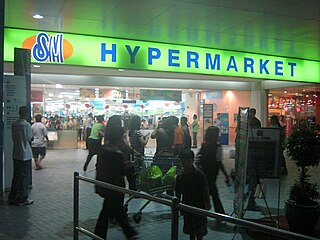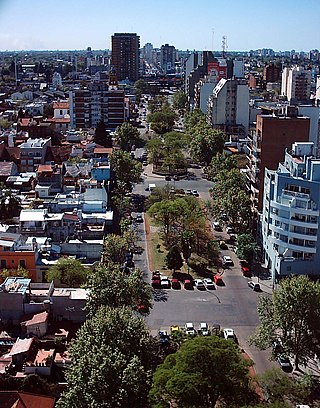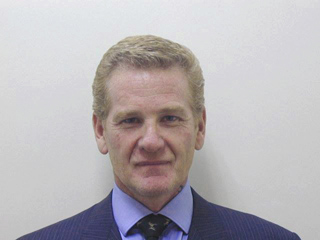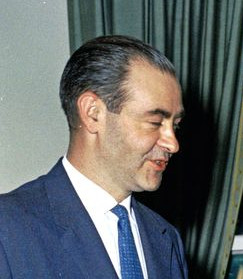
Alfredo Coto (born October 9, 1941) is an Argentine businessman.

Alfredo Coto (born October 9, 1941) is an Argentine businessman.
Alfredo Coto was born in Buenos Aires in 1941. His father, Joaquín Coto, was an immigrant from Galicia (Spain), and the owner of a small butcher shop in the Retiro section of the city. Working alongside his father from age nine, and joining him in neighborhood deliveries, Coto became a wholesaler in 1963, buying rump roast and other cuts from a Kosher butcher who could not use them. [1] He opened his own, Boedo neighborhood retail butcher in 1969, and managed the shop with his wife, Gloria. [2]
Building on the customer base that the couple had cultivated through wholesale delivery, Coto owned 20 shops by 1976, and began supplying steakhouses. He purchased a cattle ranch in 1978, and in 1981, a slaughterhouse, thus becoming his own supplier. Coto's success made him a target, however, and in 1981, he was held for 11 days in a ransom kidnapping. [1]
Operating 34 retail outlets by 1987, each averaging around 40 tons of beef and offal sales a month, he opened his first supermarket in Mar de Ajó (a seaside tourist destination). [3] Coto Supermarkets expanded rapidly afterwards, and in 1992, he opened his first hypermarket. The company opened five shopping malls from the late 1990s onwards (each anchored by a Coto hypermarket), as well as a wholesale distribution and production center in Monte Grande. [4]
The chain, a sole proprietorship, remained a private company; a Clarín article at the time, however, outlined that by 1996, it netted over a billion US dollars in sales, and that its net income exceeded US$31 million. [4]
Coto and his chain were reportedly the targets of extortion during 1996 and 1997, when bombs were placed in five outlets by the self-styled People's Revolutionary Organization. [5] More fortunate than other targets, the Coto chain suffered no damages, and the group was later apprehended by police. [6]
The acquisition of the Norte chain by French retailer Carrefour in 2000 left Coto as the largest domestic supermarket retailer in Argentina, and Coto remained third overall (behind Carrefour and Chilean retailer Cencosud). [7]
The largest domestic grocer in a country where inflation is problematic, as well as perennially contentious in politics, Coto was personally criticized in a November 2005 press conference by President Néstor Kirchner, who, discussing retailers' role in rising inflation, referred to the businessman using the company's slogan, yo te conozco ("I know you"). [8] Coto maintained cordial relations with the government, however, [9] and himself later downplayed the inflation issue. [10]

Carrefour Group, S.A., is a French multinational retail and wholesaling corporation headquartered in Massy, France. It operates a chain of hypermarkets, grocery stores and convenience stores. By 2024, the group had 14,000 stores in 40 countries. It is the seventh-largest retailer in the world by revenue.

A hypermarket or superstore is a big-box store combining a supermarket and a department store. The result is an expansive retail facility carrying a wide range of products under one roof, including full grocery lines and general merchandise. In theory, hypermarkets allow customers to satisfy all their routine shopping needs in one trip. The term hypermarket was coined in 1968 by French trade expert Jacques Pictet.

Roberto Lavagna is an Argentine economist and politician who was Minister of Economy and Production from April 27, 2002 until November 28, 2005.

Republican Proposal, usually referred to by its abbreviation PRO, is a political party in Argentina. PRO was formed as an electoral alliance in 2005, but was transformed into a national party in 2010. It is the major component of the Juntos por el Cambio coalition, and its leader is former Argentine president Mauricio Macri, who is the party's president since May 2024.

Saavedra is a barrio or neighbourhood of Buenos Aires, Argentina. It is located in the Northern end of the city, close to Nuñez and Villa Urquiza. Its northern border is Avenida General Paz. Among the main features of the neighbourhood is the Parque Saavedra, which has large picnic areas and sports facilities. During weekends, many wealthy inhabitants of Buenos Aires pass through Saavedra en route to their larger estates and country clubs. The barrio was named after Cornelio Saavedra, president of the First Governing Board, during the May Revolution of 1810.

Francisco de Narváez Steuer, known as El Colorado or Pancho, is a Colombian-born naturalized Argentine businessman, politician who ran for governor of Buenos Aires Province on the Unión PRO ballot in the 2007 elections in Argentina. He was a member of the Argentine Chamber of Deputies until late 2015.

Guillermo Moreno is an Argentine politician. He served from 2005 to 2013 as Secretary of Domestic Trade, a position to which he was appointed by President Néstor Kirchner and in which he remained under the presidency of Cristina Fernández de Kirchner until his resignation, in the midst of scandal, in November 2013. He was found guilty in March 2014 of abuse of authority and was economic attaché at the Argentine embassy in Rome.

Roberto Alemann was an Argentine lawyer, economist, publisher, and academic.

Coto C.I.C.S.A., is an Argentine supermarket chain founded by Alfredo Coto in 1970 as a butcher shop. The first Coto supermarket was opened in the city of Mar de Ajó in La Costa Partido in 1987. The chain currently has 120 supermarkets, most of them in Buenos Aires Province.

The Argentine Governments of Néstor Kirchner and Cristina Fernández de Kirchner had several conflicts with major media groups. Kirchner accused the Clarín Group, La Nación, Perfil, and related media of having promoted their overthrow.

Jumbo is a Chilean hypermarket chain with a presence in Chile, Argentina, and Colombia. Founded in 1976 by Horst Paulmann, Jumbo is a subsidiary and pillar of the Cencosud business consortium, which also owns Santa Isabel, Disco, Super Vea, and Metro supermarkets, as well as Easy and Paris stores.

Federal Peronism, also known as Dissident Peronism, is the faction or branch of either moderate, centrist or right-wing Peronism, that is currently identified mostly by its opposition to Kirchnerism, the left-wing faction of Peronism.

Tiendas Industriales Asociadas S.A., branded as Tía and sometimes known as Almacenes Tía, is a South American retailing brand founded in 1940. Its divisions in Ecuador and Uruguay trade under the brands Tía, MAGDA, Ta-Ta and MULTI AHORRO, where they are together the largest discount retailer, with over 450 locations. Tía S.A. (Colombia) operated 19 locations under the Tía brand, until it closed in 2017 because of poor sales.

A number of cacerolazos, pot-banging protests, took place in several cities of Argentina on September 13 and November 8, 2012. The first, in September 13, was a national protest against the policies of the president Cristina Fernández de Kirchner. The protests generated significant repercussions in local politics. The second, on November 8, was another much more massive protest in several cities in Argentina, including Buenos Aires, Córdoba, Rosario, Mendoza, Olivos, among many others throughout Greater Buenos Aires and other regions. There were also protests in Argentine embassies and consulates in cities such as New York, Miami, Madrid, Sydney, Bogotá, Santiago and Barcelona, among others. Its complaints were almost the same, but the difference in size was very big. The protests are considered not only a call to Kirchnerism, but also to the opposition, because they did not have a strong leader.

Disco is an Argentine supermarket chain. It is one of many supermarket chains part of the Chilean retail conglomerate Cencosud, after it was acquired from the Dutch retailer Ahold in 2004. In Argentina, Cencosud also owns the upscale hypermarket chain Jumbo and the budget oriented supermarket chain Vea.

Citizen's Unity was a centre-left Kirchnerist political coalition in Argentina for the 2017 legislative elections led by the former President Cristina Fernández de Kirchner.

S.A. Importadora y Exportadora de la Patagonia, doing business as La Anónima, is an Argentine chain of supermarkets that operates mainly in the region of Patagonia.

Eduardo Félix Valdés is an Argentine politician, currently serving as National Deputy elected in the Federal Capital. A member of the Justicialist Party, Valdés served as the Argentine ambassador to the Holy See during the presidency of Cristina Fernández de Kirchner.
On 1 September 2022, a man attempted to assassinate Cristina Fernández de Kirchner, the vice president and former president of Argentina. The assailant approached Fernández de Kirchner as she met with supporters outside of her official residence in Recoleta, Buenos Aires, and attempted to shoot her in the head with a semi-automatic pistol. The pistol failed to fire, and the suspect was immediately arrested on scene.